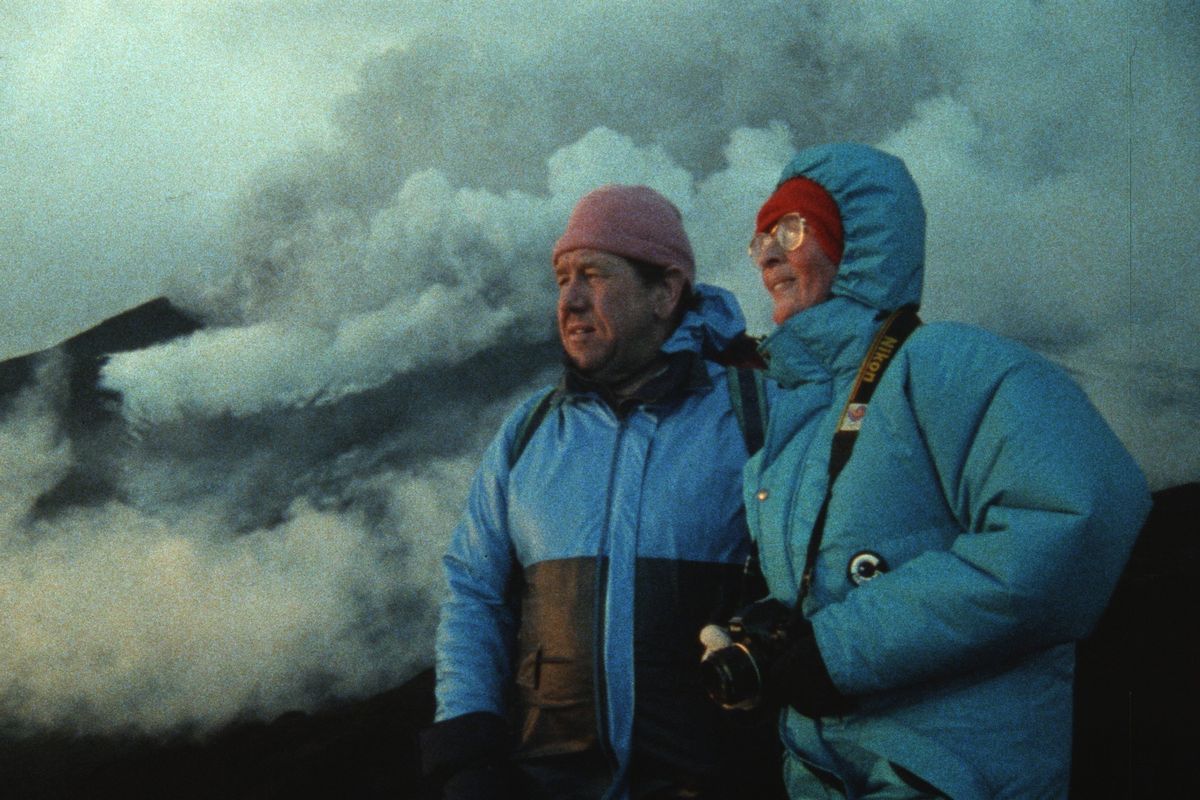Movie review: ‘Fire of Love’ doc is a portrait of a lava-obsessed Romeo and Juliet

You think your love life is hot? For French volcanologists Katia and Maurice Krafft, their shared passion burned with the heat of a planet on fire. Director Sara Dosa’s documentary “Fire of Love” assembles explosive footage from the Krafft archives to tell the fevered story of a science-minded Romeo and Juliet, so dedicated to each other and their work that they died together, victims of a pyroclastic flow during a 1991 eruption of Mount Unzen in Japan.
The couple frequently come across like explorers in a sci-fi adventure; in one 1968 expedition, we see the Kraffts don heat-resistant silver suits and metal helmets to protect against the elements. As they venture precariously close to flaming red “volcano bombs,” they look like performers in some site-specific, ecological carnival whose massive, abstract sets are going up in flames all around them.
There’s a method to their madness. Katia, a geochemist, and Maurice, a geologist, complemented each other, personally and professionally. We watch the couple gingerly scale a forbidding mountain to reach their goal: a stunning view of the Earth exploding. Isn’t that love, sharing the best and worst the world has to offer, even if that worst is shooting hot lava into the air? As if responding to the Earth’s high temperatures, their personal fire is also evident: They’re mad, and mad for each other.
With its obsessive, death-defying protagonists, “Fire of Love” seems like a vision from Werner Herzog – like “Grizzly Man” with bubbling magma in place of hungry bears. (In fact, Krafft footage did appear in the director’s 2016 feature “Into the Inferno.”) But Dosa’s tone, while similar to Herzog’s “ecstatic truth,” is quirkier, and that’s driven in part by narrator Miranda July. The filmmaker-actor-artist’s voice has a childlike but knowing quality that’s sometimes distracting, but it mostly suits such rapt lines as, “What is it, they ask, that makes the Earth’s heart beat, its blood flow?”
The narration gives “Fire of Love” the air of a fractured fairy tale, especially as July tells the story of how the Kraffts grew up about 12 miles from each other in the Alsace region of France. An animated collage shows a 19th-century lithographic view of the couple’s hometown, tectonic plates moving beneath their houses as if the Earth were inexorably bringing the pair together.
The archival footage is exciting enough, but editors Erin Casper and Jocelyne Chaput, who co-wrote the script with producer Shane Boris, make judicious use of split-screen, circular stencils and other visual effects, varying the rhythm just enough to make this world seem even more magical.
“Fire of Love” initially plays like a magical romance, a dance on the edge of an incendiary theater on a global scale. Still, this is a volatile setting for love. As the narration points out, severe weather at high altitudes “erased all bearings.” That disorientation is part of the thrill (for the Kraffts and the viewer), a neat metaphor for romantic chemistry. If the concept seems too on the nose, the natural spectacle of flowing magma and scorched terrain is endlessly mesmerizing. One could spend hours just watching Katia and Maurice walk around this alien landscape to Nicolas Godin’s ominous, pulsing score, augmented by a soundtrack that features not only electronic artists, like Brian Eno and Air, but a swinging 1960s love song from French-Italian singer Dalida.
With a mixtape like that, parts of “Fire of Love” seem like the geological equivalent of waves crashing on Burt Lancaster and Deborah Kerr in “From Here to Eternity.”
The Kraffts’ work puts them in touch with the gentler side of nature as well, and images of the couple frolicking with sea lions and squirrels can seem like paradise. But alas, their work also brought them close to what residents near a Zaire volcano describe as “the portal to hell.” While the first hour of this “Fire” smolders like an unusual domestic drama, pivotal disasters bring the lovers crashing down to earth – literally. In the Mount St. Helens blast that rocked the Pacific Northwest in 1980, the Kraffts lost a colleague, and the 1985 eruption of Nevado del Ruiz in Colombia killed more than 20,000.
Inevitably, the Kraffts were killed doing what they loved. Earlier in their career, addressing the dangers of their work, Katia declared that “I follow him because if he’s going to die, I’d rather be with him.” Whether you find that sentiment sweet or certifiable, “Fire of Love” offers up what may be the ultimate in marital consummation.